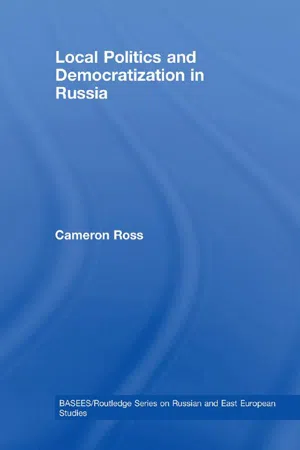![]()
1
Introduction
On 16 September 2003 a new law, ‘On the General Principles of Organizing Local-Self Government in the Russian Federation’ (hereafter, the 2003 Law)1 was ratified by the Russian parliament (the State Duma), which led to a doubling of the number of municipalities (from 11,957 to 24,208) by December 2005.2 The first major round of elections to these new municipalities took place over the period 2004–5, and by December 2005, 198,815 deputies and 13,655 heads of local administrations had been duly elected.3 In addition, the creation of the new municipalities required the recruitment and training of hundreds of thousands of administrative personnel. It is somewhat surprising, given the vast numbers of citizens who are now engaged in grass-roots politics, that the study of local self-government in Russia has been somewhat neglected. While there have been a plethora of scholarly works devoted to regional politics, there have been far fewer books devoted to municipal politics, and even fewer that deal with both politics and finance.4 In Russia the study of local government has been dominated by legalistic studies, which focus on the formal rights and powers of municipalities.5 In this study I provide an account of local government reforms from Gorbachev to Putin, and I examine local level politics and finance.
The importance of local government
As Porter and Young rightly stress:
Moreover, for many scholars the development of local level democracy is an essential if not a sufficient condition for the consolidation of democracy at the national level. As Pratchett argues, ‘from Tocqueville onwards, there has been a strong normative argument within political theory that local self-government is a fundamental component of broader democratic structures and practices’.7 By serving as a ‘school of democracy’ and a ‘training ground’ for national level politicians, local government ‘provides the foundation for strong national democratic institutions and practices’.8 As Sisk notes:
In a similar vein Hahn argues,
Finally, for Peter John, local democracy:
Federalism and local self-government
As I shall demonstrate in this study, the development of local government and the struggle to form viable local democracies have been inextricably tied to the development of federalism in Russia and the wider struggle for power between Russia’s 89 federal subjects (regions, republics and autonomies) and the Kremlin.12 The structures and powers (both formal and informal) of local governments in post-communist Russia vary significantly across the Federation. These variations spring primarily from the development of high levels of constitutional, socio-economic and political asymmetry, which developed, in Russia’s federal subjects during the Yeltsin era (1991–9). During this period we witnessed the creation of a highly politicized ‘contract form’ of federalism, which granted some federal subjects (the ethnic republics) far greater powers than others (the territorially defined federal subjects), and, in particular, allowed the ethnic republics to shape their own political institutions, including their local governments.
The three major laws that have been adopted on local self-government in the post-communist era (in 1991,13 1995,14 and 200315) have been intimately linked to this wider power struggle between the centre and the periphery, and to the specific nature of Russia’s highly politicized and negotiated form of federalism. At times local government has been used as a mere ‘pawn’ by the federal government in its attempt to gain greater power over the federal subjects. Many regional administrations, on the other hand, have also sought to subjugate or limit the powers of local self-governments, as part of their power-struggles with the centre.
Defining democracy
In order to assess the prospects for the development of a viable form of democracy in Russia’s localities we need to define what we mean by this highly contested concept. As Diamond notes, David Collier and Steven Levitsky have uncovered over ‘550 subtypes of democracy’.16
For Diamond and Morlino, at a minimum democracy requires:
1 universal, adult suffrage
2 recurring, free, competitive, and fair elections
3 more than one serious political party
4 alternative sources of information.
If elections are to be truly meaningful, free and fair, there must be some degree of civil and political freedom beyond the electoral arena so that citizens can articulate and organize around their political beliefs and interests.17
Robert Dahl lists the following eight ‘institutional guarantees’ that citizens must enjoy before a country can be classified as a democracy:
1 freedom to form and join organizations
2 freedom of expression
3 right to vote
4 eligibility for public office
5a right of political leaders to compete for support
5b right of political leaders to compete for votes
6 alternative sources of information
7 free and fair elections
8 institutions for making government policies depend on votes and other expressions of preference.18
Diamond also stresses the importance of contestation in free and fair elections but, in his definition of ‘liberal democracy’, he places much greater emphasis on the provision of civil and political liberties. His definition of ‘liberal democracy’ is both broader and stricter than Dahl’s more ‘minimalist’ definition of ‘electoral democracy’. While Dahl and other minimalists, such as Schumpeter and Huntington, ‘acknowledge the need for minimal levels of civil freedom, in order for competition and participation to be meaningful, they do not devote much attention to the basic freedoms involved, nor do they attempt to incorporate them into actual measures of democracy.’19 For Diamond there are nine essential attributes of a ‘liberal democracy’:
1 Real power lies – in fact as well as in constitutional theory – with elected officials and their appointees, rather than with unaccountable internal actors (e.g. the military) or foreign powers.
2 Executive power is constrained constitutionally and held accountable by other government institutions (such as an independent judiciary, parliament, ombudsman and auditor general).
3 Not only are electoral outcomes uncertain, with a significant opposition vote and pr...
